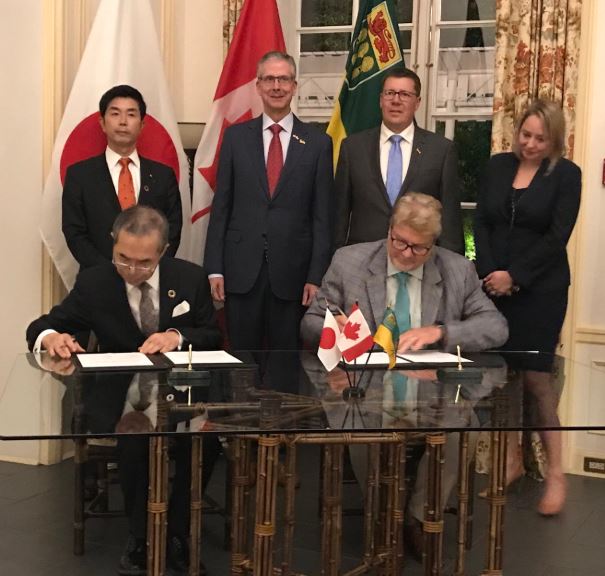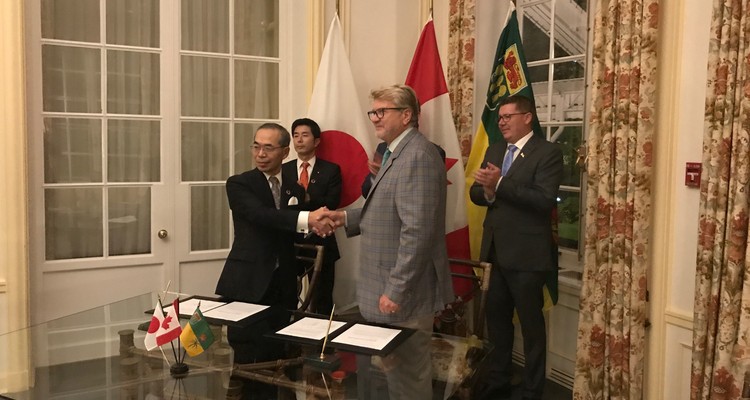For Immediate Release
Tokyo, JAPAN – With a shared interest and desire to take impactful action on climate change by significantly cutting carbon emissions, organizations representing Japan and Saskatchewan have agreed to collaborate on accelerating the use and understanding of carbon capture utilization and storage (CCS/CCUS). A joint commitment in the form of a Memorandum of Understanding (MOU) was signed today, by Japan CCS Co., Ltd, (based in Tokyo, Japan) and the International CCS Knowledge Centre (based in Regina, Saskatchewan, Canada).

Mike Monea, President & CEO International CCS Knowledge Centre.
On hand to witness the signing: Hideki Makihara, State Minister of Economy,
Trade and Industry of Japan; Ian Burney, Ambassador of Canada to Japan;
Scott Moe, Premier of Saskatchewan, and Beth Hardy, Vice President,
International CCS Knowledge Centre.
CCS/CCUS is recognized by the UN Intergovernmental Panel on Climate Change (IPCC) as a necessary technology to meet global climate change goals under the Paris Agreement, and is an indispensable component in the portfolio of technologies required to achieve the two degree scenario.
The MOU signals a path forward to collaborate in the development, demonstration and deployment of CCS/CCUS thereby reducing greenhouse gas (GHG) emissions and providing energy security.
Japan CCS Co., Ltd. is conducting on behalf of the Japanese government the Tomakomai CCS Demonstration Project to demonstrate the viability of full-chain CCS in Japan. Valuable knowledge and experiences are being acquired.
As a pioneer in CCS/CCUS, the Canadian based, International CCS Knowledge Centre joins forces with Japan CCS Co. to facilitate the sharing of the experience and lessons-learned acquired from the construction through operation and maintenance of SaskPower's Boundary Dam 3 CCS Facility - the world’s first commercial scale, post-combustion CCS/CCUS facility on a coal-fired power plant.
The International CCS Knowledge Centre and Japan CCS Co. will work closely to exchange information and knowledge of CCUS acquired through the conduct of their projects, in order to share and disseminate such information with a view to advancing the deployment of CCUS in the world.
On hand to witness the signing of the MOU was Scott Moe, Premier of Saskatchewan, Ian Burney, Ambassador of Canada to Japan and Hideki Makihara, State Minister of Economy, Trade and Industry of Japan (METI).
Quotes
“We are delighted to have a partnership with Japan CCS Co. as we work in concert to make an impact in reducing global carbon emissions with carbon capture and storage.”
- Mike Monea, President & CEO, International CCS Knowledge Centre
"It is important to share experiences and knowledge in order to progress CCS as a global mitigation measure, and we are happy to collaborate with the International CCS Knowledge Centre.”
- Shoichi Ishii, President of Japan CCS Co., Ltd.
“Saskatchewan is helping lead the world in innovative technologies that can reduce greenhouse gas emissions around the world. The collaboration between the International CCS Knowledge Centre and Japan CCS Co. highlights Saskatchewan’s global leadership on CCUS and the impact this innovative technology can have far beyond our borders.”
- Scott Moe, Premier of Saskatchewan, Canada
- 30 -
Quick Facts
Japan & Canada
- CCUS is identified as one of the shared areas of focus between Japan and Canada in their Memorandum of Cooperation on cooperation in the field of energy, which was signed at the G20 Ministerial Meeting on Energy Transitions and Global Environment for Sustainable Growth in June 2019, in Karuizawa, Japan.
Examples of large-scale CCUS initiatives in Canada, include: SaskPower’s BD3 CCS Facility; Weyburn-Midale CO2 Monitoring & Storage Project; Aquistore CO2 Storage Project; and the Quest CCS Facility.
- As outlined in Japan’s 5th Strategic Energy Plan, with regard to CCUS, “research and development will be conducted with a view to practical use of the carbon dioxide capture, utilization and storage (CCUS) technology around 2020 and, with due consideration given to the possible timing of the commercialization of carbon capture and storage (CCS) technology”.
Links
Climate Change
- At no point in history were levels of CO2 concentrations as high or increasing as fast as it is now in modern day - Keeling Curve: A Daily Record of Atmospheric Carbon Dioxide (Scripps Institution of Oceanography, UC San Diego)
- CCS is considered essential in three of the four pathways to keep global warming within 1.5oC - Intergovernmental Panel on Climate Change: Global Warming of 1.5 Degrees Celsius
- Most of the world can’t meet emissions targets without CCS – and for those that can, the median increase in mitigation cost is 138% - Intergovernmental Panel on Climate Change: IPCC AR5 2014
CCUS/CCS
- IEA Greenhouse Gas R&D Programme (IEAGHG): What is CCS?
- Global CCS Institute: CCS Readiness Index
- Shand CCS Feasibility Study shows; 2nd generation CCS can be 67% cheaper
Contacts
Jodi Woollam, Head of Communications & Media Relations
jwoollam@ccsknowledge.com; T: +1-306-565-5956 / M: +1-306-520-3710 / F: +1-306-565-5668
Chiyoko Suzuki, Manager, International Relations Department
chiyoko.suzuki@japanccs.com; T:+81-3-6268-7387 / F:+81-3-6268-7385
About the International CCS Knowledge Centre (Knowledge Centre): Operating since 2016 under the direction of an independent board, the Knowledge Centre was established by BHP and SaskPower with a mandate to advance the global understanding and deployment of large-scale CCS to reduce global GHG emissions. The Knowledge Centre provides the know-how to implement large-scale CCS projects as well as CCS optimization through the base learnings from both the fully-integrated Boundary Dam 3 CCS Facility and the comprehensive second-generation CCS study, known as the Shand Study. For more info: https://ccsknowledge.com/
About Japan CCS Co., Ltd.: Commissioned by the Japanese government to demonstrate a full-chain CCS system in Tomakomai City, Hokkaido, Japan CCS Co., Ltd. (JCCS) was founded in May 2008 when a group of major companies with expertise in CCS-related fields, including electric power, petroleum, oil & gas exploration and development, and plant engineering, joined forces to answer the Japanese government’s call for development of CCS technology as a countermeasure against global warming. JCCS is a unique company in the world to be founded and dedicated explicitly to developing integrated CCS technology. For more info: https://www.japanccs.com/en/
#CCSKnowledge #CleanTech #CCUS #BoundaryDam #ClimateAction

 News
News